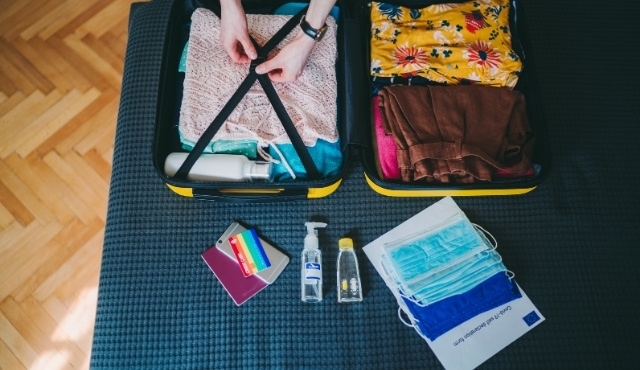Latest updates on Covid-19 and ferry travel in Greece
Safe sail to the Greek islandsDo I need any documents to catch a ferry in Greece? How can I travel safely by ferry to the Greek islands in 2023? Is it safe to travel to Greece?
Find all latest updates for ferry travel and coronavirus in Greece. Learn about any ferry travel measures and read tips to stay safe from Covid-19 during your ferry journey.

The picturesque port of Ermoupoli in Syros
Latest Covid-19 ferry travel updates for Greece
Passengers traveling by ferry to the Greek islands or going island hopping between different islands don't need any Covid-19 documents.
Also, passengers traveling to Greece from abroad are not required to complete and carry the Passenger Locator Form (PLF) to board ferries serving domestic routes in Greece.
Currently, there are no ferry travel restrictions due to Covid-19. You can catch a ferry to the Greek islands from all mainland ports and you can also go island-hopping between all island groups!
Important: you need to show your ID card, passport or other official identity document to the relevant authorities to board the ferry.
Ferries between Greece and Italy: Covid-19 updates
See all necessary documents and coronavirus updates for ferries between Greece and Italy.

The long sandy beach of Makris Gialos in Kefalonia
How to stay safe from Covid-19 during your ferry trip in Greece?
Catching the ferry in Greece is one of the safest ways to travel, due to the open-air and roomy spaces, as well as private accommodation options. By following a series of individual protective measures you can have a safe trip to the Greek islands.
In case you feel unwell or you exhibit any common coronavirus symptoms, you may see a medical professional before your trip or avoid unnecessary traveling.
Good to know: masks are not mandatory on board Greek ferries regardless of outdoor or indoor spaces.
Covid-19 safety tips
Here are some useful tips on how to stay healthy and feel safer when traveling by ferry in Greece:
- Bring your own mask, gloves, hand-sanitizer and reusable water bottle.
- Thoroughly wash your hands with warm water and plenty of soap or use a hand sanitizer.
- Cover your mouth and nose when sneezing or coughing and avoid touching your eyes, mouth, and nose.
- Adjust or postpone the ferry trip in case you’re experiencing any Covid-19 symptoms.
- Book a private cabin to share with your fellow travelers, to avoid mingling with the rest of the passengers.
- If the weather conditions are good, try to spend most of your time on the outdoor deck.
- Have up-to-date health insurance, and research for medical professionals in Greece before you arrive.

Masks, sanitizers and ferry trip safety essentials
What Covid-19 safety measures do ferries in Greece follow?
Ferry companies in Greece follow enhanced safety protocols as a response to the Covid-19 outbreak. They abide by official state regulations as regards testing and essential training, and they closely monitor the situation in Greece. More specifically:
- All indoor and outdoor spaces are regularly and professionally cleaned with certified products. Tablecloths, sheets and other shared items are properly disposed, replaced and disinfected.
- Some ferry companies in Greece have introduced contactless check-in and e-tickets to minimize contact with crew and other passengers.
- Crew members have received hygiene and coronavirus prevention training.
- Air-conditioning units are cleaned regularly and fitlered fresh air is not recirculated.
Good to know: Covid-19 safety measures and travel restrictions for Greece are subject to change depending on the virus situation.

Professional cleaning staff disinfecting the outdoor space of a ferry
Where to find more information about traveling amidst Covid-19?
For more information on traveling and staying safe from Covid-19, have a look at our FAQ page, contact your ferry company, follow official travel warnings for Greece issued by your country of origin, and visit the official Greek tourism website for queries related to the coronavirus situation in Greece.
Tip: we are closely monitoring all Covid-19 ferry requirements for the Greek islands, so don't forget to visit this page frequently for the latest ferry news for Greece!
#SailSafe